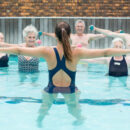The Benefits of Gardening for Seniors in Senior Living
Discover how gardening can enhance the physical, mental, and emotional well-being of seniors in senior living communities. Learn about the numerous benefits and find out why gardening is a perfect activity for older adults. Read on to find out more!

Gardening provides many benefits for seniors, making it a valuable activity in senior living communities. It offers physical exercise, mental stimulation, and emotional satisfaction. Engaging in gardening helps older adults stay active, which is vital for maintaining their health and well-being.
In senior living communities, staying active and engaged is important. Gardening keeps older adults physically fit and mentally sharp. It also fosters social connections and creates a sense of purpose.
In this article from Koelsch Communities, we will explore the physical, mental, social, and emotional benefits of gardening for seniors. You’ll learn how gardening can improve mobility, reduce stress, enhance cognitive function, and build a sense of community. You’ll discover practical tips for safe gardening, and learn which types of gardens are most suitable for seniors. Let’s dive into the many ways gardening enriches the lives of seniors in our communities.
Gardening for Seniors as a Therapeutic Activity
Horticultural Therapy for Seniors
Horticultural therapy uses gardening to improve physical and mental health. This therapy helps seniors enhance their mood, reduce stress, and boost cognitive function. Many senior living communities offer structured gardening activities led by trained therapists. These programs provide hands-on experiences that engage seniors in planting, nurturing, and harvesting plants. Residents find joy and purpose through these therapeutic gardening sessions, which promote a sense of accomplishment and well-being.
Improving Overall Well-Being
Gardening offers holistic benefits for seniors’ well-being. It combines physical activity, mental stimulation, social interaction, and emotional satisfaction. Seniors who garden experience improved mobility and strength, reduced anxiety, and a stronger sense of community. The act of tending to plants also boosts self-esteem and confidence. These combined benefits make gardening a cherished activity that supports overall health and happiness in senior living communities.
One of the most notable health benefits of gardening is its ability to relieve and anxiety. The act of tending to plants and spending time in nature has a calming effect on the mind. Gardening offers a peaceful retreat from daily worries, providing a therapeutic experience that promotes mental well-being.
Physical Benefits of Gardening for Seniors
Gardening as a Form of Exercise
Gardening involves a range of physical activities that provide a gentle workout for seniors. Planting seeds, pulling weeds, and watering plants require movements that keep the body active. These garden tasks promote flexibility and enhance grip strength and dexterity. While busy in the garden, seniors perform exercises like stretching to reach plants, lifting small pots, and squatting to tend to garden beds. These activities keep the muscles engaged and the joints moving. Raking leaves and turning soil can also be beneficial, offering a moderate cardiovascular workout that supports heart health. By varying the gardening tasks they take on and pacing themselves, seniors can enjoy a balanced form of light exercise that suits their abilities.
Improved Mobility and Strength
Gardening is a great way to help improve muscle strength and joint flexibility in seniors. Tasks like digging and raking build upper body strength, while bending and stretching improve lower body flexibility. Regular gardening activities encourage the use of different muscle groups, leading to better overall mobility. Active engagement in gardening helps seniors maintain their physical health and independence. Handling tools and moving around the garden enhances coordination and balance, which reduces the risk of falls. The consistent, moderate physical activity involved in gardening supports healthier joints and muscles while contributing to a more active lifestyle.
Gardening and the Elderly: Mental Health Benefits
Reduction of Stress and Anxiety
Gardening promotes relaxation and relieves stress. When seniors tend to plants, they immerse themselves in the natural world. The simple act of touching soil and watching plants grow can calm the mind. Spending time outdoors in the fresh air also helps to lower stress levels. The rhythmic tasks of planting, watering, and pruning provide a meditative experience, helping to clear the mind and reduce anxiety. Seniors often find that gardening provides a peaceful escape from daily worries, contributing to an overall sense of well-being.
Enhancement of Cognitive Function
Gardening activities stimulate the brain. Tasks like planning a garden layout, choosing plants, and remembering care routines engage cognitive skills. These activities improve memory and keep the brain active. Seniors who garden regularly often experience better focus and enhanced problem-solving abilities. The variety of tasks involved in gardening—from sorting seeds to monitoring plant health—encourages critical thinking. Gardening offers a practical way to keep the mind sharp and alert by providing mental challenges that are both enjoyable and beneficial.
Social Benefits of Gardening in Senior Living Communities
Fostering Community and Social Interaction
Gardening in senior living communities often becomes a group activity that encourages residents to work together. It offers a unique way for seniors to bond, share experiences, and create lasting friendships. Working side by side, they exchange gardening tips, share stories, and enjoy each other’s company. These social interactions help build a strong sense of community and belonging. Sessions for a gardening group can include planting days, seasonal celebrations, and harvest festivals, providing regular opportunities for social engagement.
Participating in Community Gardens
Community gardens in senior living communities provide a shared space where residents can collaborate on gardening projects. These gardens offer raised beds, making them accessible to everyone. Residents plan, plant, and maintain the gardens together, creating a sense of teamwork and mutual achievement. Collaborative gardening projects not only beautify the community but also enhance social connections and foster a supportive environment. Examples include shared vegetable plots, flower beds, and sensory gardens designed for relaxation and enjoyment. These projects encourage residents to take pride in their community while enjoying the therapeutic benefits of gardening.
Emotional Benefits of Gardening for Seniors
Sense of Accomplishment and Purpose
Gardening provides seniors with a strong sense of purpose. Tending to plants, watching them grow, and harvesting produce can bring immense joy. This daily activity gives seniors something meaningful to do and look forward to. For many, the act of nurturing a garden instills pride and fulfillment. Seeing the results of their hard work bloom in front of them boosts their spirits and creates a sense of accomplishment. For example, seniors might take pride in growing their vegetables, knowing they contribute to their meals. This ongoing process of care and attention fosters a deeper connection to the natural world and their community.
Boosting Self-Esteem and Confidence
Gardening helps seniors overcome challenges and build confidence. Dealing with the various tasks involved, from planting to pruning, empowers them. Each small victory, like successfully growing a new plant or solving a garden-related problem, enhances their self-esteem. Overcoming these hurdles shows seniors they can still achieve and succeed, even in later life. This boost in confidence can positively impact other areas of their lives. Additionally, sharing gardening successes with friends and family can reinforce their sense of achievement and personal worth.
Types of Gardens Suitable for Seniors
Raised Bed Gardens
Raised bed gardens offer several advantages for seniors. They reduce the need to bend and kneel, making gardening more comfortable and accessible. Raised garden beds also improve soil drainage and can be placed at a convenient height, which helps prevent back strain.
To set up a raised bed garden, choose a sunny location. Build or buy a raised bed frame and fill it with high-quality soil and compost. Plant a variety of vegetables, herbs, or flowers. Maintain the garden by regularly watering, weeding, and adding mulch to retain moisture. Raised beds are perfect for growing crops like lettuce, tomatoes, and herbs, which thrive in well-drained soil.
Container Gardens
Container gardening is a versatile option for seniors. It allows them to grow plants in pots, which can be easily moved and managed. This method is ideal for small spaces like patios or balconies and provides flexibility in plant placement.
For container gardens, select easy-to-grow plants such as cherry tomatoes, basil, and marigolds. Use lightweight pots with good drainage holes. Place the containers in sunny spots and use potting soil for best results. Regularly water and fertilize the plants to keep them healthy and thriving. Container gardens are ideal for adding color and fresh produce to any living space.
Practical Tips for Safe Gardening for Seniors
Using Ergonomic Tools
Using senior-friendly gardening tools can make a significant difference in comfort and safety. Ergonomic tools are designed to reduce strain and provide better grip and control. Lightweight pruners are easy to handle and reduce hand fatigue. Long-handled trowels and cultivators help seniors avoid bending and kneeling, minimizing stress on the back and knees. Padded kneelers and garden seats offer additional support and comfort. Look for tools with soft, non-slip handles that fit comfortably in the hand, ensuring a secure grip even when wet. These ergonomic features make gardening more accessible and enjoyable for seniors.
Preventing Injuries and Strains
Safety while gardening is essential. Follow these tips to prevent injuries:
- Warm up before starting to loosen muscles and joints.
- Use proper techniques for lifting and bending. Bend at the knees and hips, not at the waist, to avoid back strain.
- Take regular breaks to rest and hydrate, preventing overexertion.
- Wear gloves to protect hands from cuts and blisters, and supportive shoes to prevent slips and falls.
- Use sunscreen and wear a hat to protect from sun exposure.
By following these practices, seniors can enjoy gardening safely and comfortably.
Closing Thoughts
Gardening offers numerous benefits for seniors. It provides physical exercise, which helps improve mobility and strength. Mentally, gardening reduces stress and anxiety while enhancing cognitive function. Socially, it fosters community and social interaction, creating a sense of belonging. Emotionally, gardening gives seniors a sense of accomplishment and boosts self-esteem.
We encourage seniors to engage in gardening activities. Whether it’s planting a small container garden or joining a community gardening group, the rewards are substantial. Gardening not only improves physical and mental health but also brings joy and a sense of purpose. By participating in gardening, seniors can enhance their overall well-being and enjoy a fulfilling and active lifestyle.
About Koelsch Communities
Koelsch Communities offers a wide range of “Mom-approved” senior living options designed to create fulfilling and enjoyable experiences. With over 60 years of experience, we have built a reputation for providing top-quality care and exceptional living environments. Our communities are staffed by professionals dedicated to treating our Ladies and Gentlemen with respect and providing the special attention they need.
We pride ourselves on our high customer satisfaction, which reflects our commitment to excellence. Our experienced team ensures that every resident feels valued and cared for, promoting a thriving and supportive community atmosphere.
For more information about our senior living options and to discover how we can help you or your loved one enjoy the finest living experiences, please contact us today. We look forward to welcoming you to our community and helping you find the perfect senior living solution.
Disclaimer: This article is for informational purposes only and does not constitute medical, legal, or financial advice. It’s recommended to consult with a medical, legal, or financial professional for your specific circumstances.









